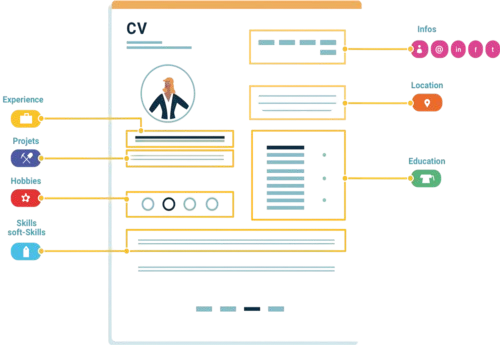Get Ready to Subscribe Resume parser API
"The Power of Applicant Tracking Systems (ATS): Maximizing Efficiency and Hiring Success"

What is a Resume Parser?
A resume parser is a software tool or service that uses natural language processing (NLP) and machine learning algorithms to automatically extract and organize information from resumes. It breaks down unstructured resume content into structured, searchable data, enabling recruiters and hiring managers to quickly find relevant details like work experience, education, skills, and contact information.
Typically integrated within an Applicant Tracking System (ATS) or recruiting platform, resume parsers make it much easier to filter, search, and categorize large volumes of resumes. This speeds up the initial screening process, helping hiring teams find top candidates without having to read through each resume manually.
How Does a Resume Parser Work?
A resume parser analyzes a resume document, identifies and categorizes key data points, and outputs this information in a structured format. The parser looks for specific fields—such as job titles, company names, dates of employment, education details, and skills—and maps them to predefined categories. Most resume parsers can handle a range of file types (PDF, DOCX, etc.) and are designed to recognize various resume formats and layouts.
Some advanced resume parsers use AI and machine learning to "learn" from different resume formats over time, improving their accuracy and adaptability. This capability enables them to recognize unconventional resume styles or language usage, making them highly effective for diverse candidate pools.
Why Do You Need a Resume Parser API?
A Resume Parser API offers an easy way to add resume parsing functionality to your existing systems or platforms without needing to build the parsing technology in-house. APIs are advantageous because they provide the flexibility to integrate resume parsing directly into your ATS, HR platform, or CRM, allowing for a seamless recruitment experience. Here are several compelling reasons to consider using a resume parser API:
1. Time Savings and Improved Efficiency
A resume parser API can automate one of the most time-consuming tasks in recruiting: screening resumes. By quickly extracting key information, recruiters can focus on high-value tasks like interviewing and engaging with candidates rather than sorting through large volumes of resumes manually.
2. Accurate Candidate Matching
Resume parsers identify critical data points, allowing recruiters to filter candidates based on specific skills, experiences, or qualifications. This makes it easier to match candidates with job requirements, resulting in higher-quality shortlists and faster decision-making.
3. Enhanced Candidate Experience
Many resume parser APIs support auto-filling of application forms, reducing the need for candidates to repeatedly enter information. This streamlines the application process, making it quicker and more pleasant for applicants, which can improve your employer brand.
4. Standardized Data for Better Analysis
By converting unstructured resume content into structured data, a resume parser API makes it easier to perform data analysis on your talent pool. You can track hiring metrics, spot trends, and gain insights into the qualifications and skills of applicants, helping to optimize your recruitment strategy.
5. Multi-Format Compatibility
Resume parser APIs are designed to handle different file formats and layouts, making them compatible with the variety of documents that candidates might submit. This flexibility improves your chances of capturing all necessary information from resumes regardless of format.
6. Scalability for High-Volume Hiring
For organizations that receive hundreds or thousands of applications, a resume parser API allows for easy scalability. It can process large numbers of resumes quickly, without placing additional strain on HR resources, making it ideal for large-scale recruitment efforts or periods of high hiring demand.
7. Reduced Bias in Screening
By enabling data-driven candidate selection, a resume parser API can help minimize unconscious bias during the early screening stage. When candidate data is extracted and categorized based on skills and experience rather than formatting or presentation, recruiters can make more objective decisions.
Key Features to Look for in a Resume Parser API
When selecting a resume parser API, consider the following features to ensure it meets your recruitment needs:
Accuracy and Flexibility: Look for parsers with high accuracy rates and the ability to handle a wide range of resume formats and languages.
Integration Ease: The API should be easy to integrate into your ATS, HRIS, or CRM system, offering flexibility for various use cases.
Customizable Fields: Ideally, the parser should allow you to customize the fields or data points to align with your unique hiring requirements.
Data Privacy and Security: Choose a provider that complies with data protection standards like GDPR and ensures secure handling of candidate information.
AI and Machine Learning Capabilities: Advanced AI capabilities will improve parsing accuracy over time, especially when dealing with unconventional resumes.
Multi-Language Support: If your organization hires internationally, multi-language parsing capabilities can be highly valuable.
Conclusion
A resume parser API is a powerful addition to any recruitment toolkit, providing significant advantages in speed, efficiency, and accuracy. By automating the extraction of key candidate information, a resume parser API reduces the administrative burden on recruiters, allowing them to focus on building relationships with candidates and making informed hiring decisions. Whether you're looking to optimize your existing ATS or enhance your recruiting platform, a resume parser API can streamline your hiring process, helping you attract and hire the best talent faster and more effectively.


